

Slang? Maybe Not Such A Bad Thing. Thumbs—they’re good for more than just hitchhiking.

Teens these days do not use their thumbs for hitching rides on the side of the road. They use their thumbs to text rapid-fast messages to their friends on their cellphones. But, because keypads on cellphones are so tiny and typically thumbs are not, and each number key represents multiple letters, the tight maneuvering can lead to quite a few spelling mistakes. Mistakes that can lead to hilarity—and to neologisms. That’s right. For instance, did you know that pwn means own and that noobs means newbies? But how can a spelling mistake become a word added to our common lexicon? But do we have to worry about how slang and short forms is affecting teens’ language development? This viewpoint on teens and text-messaging is a departure from our opinion of text messaging and language development in children who are in the lower-level grades and who are still are acquiring their language skills.
Ethics & Standards. Ethics is central to everything we do whether in research or practice.
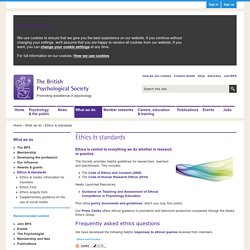
The Society provides helpful guidelines for researchers, teachers and practitioners. This includes: Newly Launched Resources: Guidance on Teaching and Assessment of Ethical Competence in Psychology Education Plus other policy documents and guidelines, which you may find useful. Our Press Centre offers ethical guidance to journalists and television production companies through the Media Ethics Group.
We have developed the following helpful responses to ethical queries received from members. Aca code of ethics. PSYB2 ID: Ethical Issues & Good Practise Guidelines for CBT. Code of Ethics. Mental Health, forced-drugging, forced treatment, control, freedom of thought, cognitive liberty, law. Cognitive Liberty & Mental Health What exactly is "mental health" and who gets to decide whether or not your mind is healthy?
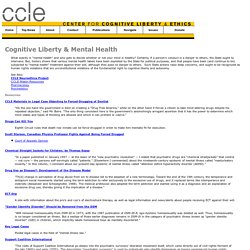
Certainly, if a person's conduct is a danger to others, the State ought to intervene. Psychosis and schizophrenia in adults: prevention and management. This guideline covers recognising and managing psychosis and schizophrenia in adults.
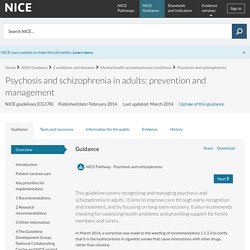
It aims to improve care through early recognition and treatment, and by focusing on long-term recovery. It also recommends checking for coexisting health problems and providing support for family members and carers. In March 2014, a correction was made to the wording of recommendation 1.1.3.3 to clarify that it is the hydrocarbons in cigarette smoke that cause interactions with other drugs, rather than nicotine. This guideline updates and replaces NICE guideline CG82 (March 2009). Your responsibility The recommendations in this guideline represent the view of NICE, arrived at after careful consideration of the evidence available. Untitled. 8.01 Institutional Approval When institutional approval is required, psychologists provide accurate information about their research proposals and obtain approval prior to conducting the research.
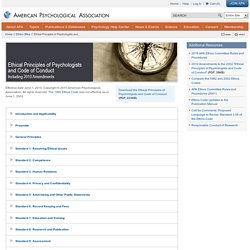
They conduct the research in accordance with the approved research protocol. (b) Psychologists conducting intervention research involving the use of experimental treatments clarify to participants at the outset of the research (1) the experimental nature of the treatment; (2) the services that will or will not be available to the control group(s) if appropriate; (3) the means by which assignment to treatment and control groups will be made; (4) available treatment alternatives if an individual does not wish to participate in the research or wishes to withdraw once a study has begun; and (5) compensation for or monetary costs of participating including, if appropriate, whether reimbursement from the participant or a third-party payor will be sought.
Code of human research ethics dec 2014 inf180 web. MHA Code of Practice. BABCP Standards of Conduct Performance and Ethics. Code of Ethics. Psychoanalysis. Psychoanalysis is a set of psychological and psychotherapeutic theories and associated techniques, originally popularized by Austrian physician Sigmund Freud and stemming partly from the clinical work of Josef Breuer and others.
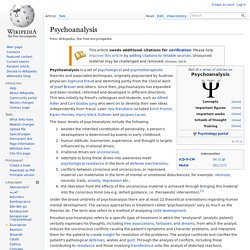
Since then, psychoanalysis has expanded and been revised, reformed and developed in different directions. This was initially by Freud's colleagues and students, such as Alfred Adler and Carl Gustav Jung who went on to develop their own ideas independently from Freud. Later neo-Freudians included Erich Fromm, Karen Horney, Harry Stack Sullivan and Jacques Lacan. The basic tenets of psychoanalysis include the following: Under the broad umbrella of psychoanalysis there are at least 22 theoretical orientations regarding human mental development.
Psychoanalysis has received criticism from a wide variety of sources. History[edit] 1890s[edit] The idea of psychoanalysis first started to receive serious attention under Sigmund Freud. 1900–1940s[edit] 1940s–present[edit] Biological treatments of mental illness and abnormality. Biological treatments of mental illness and abnormalityBiological treatments act directly on the biological mechanisms that cause, or are involved in, mental illness.
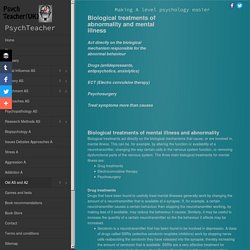
This can be, for example, by altering the function or availability of a neurotransmitter, changing the way certain cells in the nervous system function, or removing dysfunctional parts of the nervous system. The three main biological treatments for mental illness are:Drug treatmentsElectroconvulsive therapyPsychosurgeryDrug treatmentsDrugs that have been found to usefully treat mental illnesses generally work by changing the amount of a neurotransmitter that is available at a synapse. If, for example, a certain neurotransmitter causes a certain behaviour then stopping the neurotransmitter working, by making less of it available, may reduce the behaviour it causes. Rational-Emotive-Behavioural Therapy (REBT) RE & CBT.